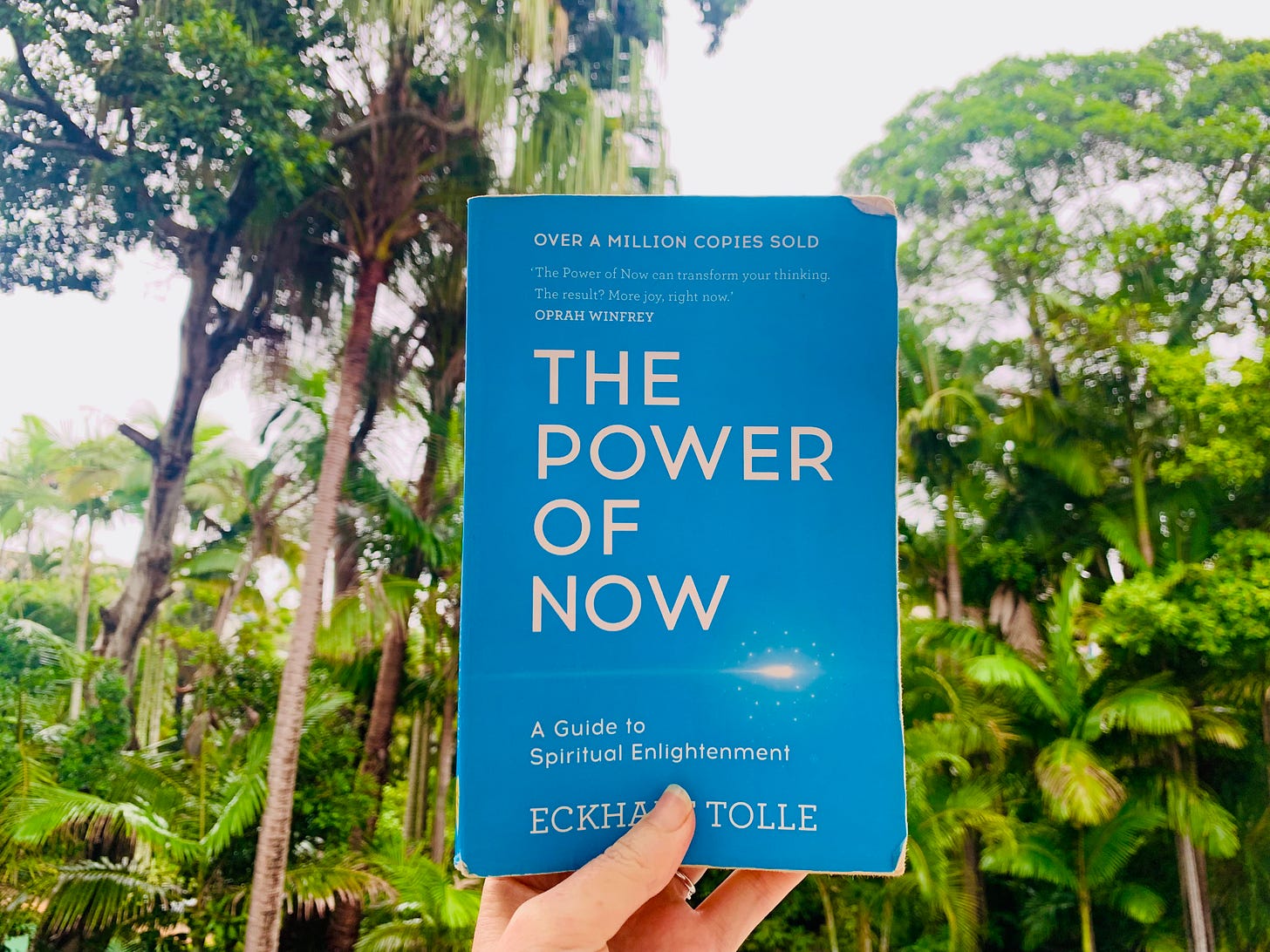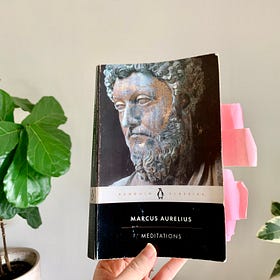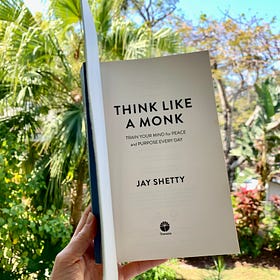24 Essential Lessons From The Power Of Now by Eckhart Tolle: Book Summary
What you need is already within.
I treasure so many books. But if there’s one I would recommend above all else: it’s this one.
The Power of Now has truly changed my life. I read it time and again, and it never loses its importance.
Eckhart Tolle wrote the book after years of intense depression and anxiety. He had what he calls an ‘awakening’ one evening.
When he woke, Tolle was filled with amazement about the miracle of life. Simple objects, light, and sounds had all become heightened and beautiful. Importantly, he was filled with a sense of peace that he claims has never left him in the many years since. The book helps us understand how to access that same peace.
These are the essential things I’ve learned from The Power of Now.
1. What you need is already within
“I am that stranger who has nothing to give you and who is telling you to look inside. Not inside any box as in the parable, but somewhere even closer: inside yourself.”
While we search the world for success, riches, and excitement, what we are really seeking is within, says Tolle. There is an unshakable peace that we can all find within if we are willing to look.
2. Identifying with your mind is an issue
“Identification with your mind creates an opaque screen of concepts, labels, images, words, judgments, and definitions that blocks all true relationship. It comes between you and yourself…”
Tolle writes at length about the little voice in our heads. He encourages us to be aware of it and to consider the question: ‘Is that really me?’
3. You could be addicted to thinking
“Not being able to stop thinking is a dreadful affliction, but we don’t realize this because almost everybody is suffering from it, so it is considered normal.”
If you’ve ever tried meditation you’ll have noticed that not only is there a voice in your head – that voice never shuts up. Even a few seconds of inner silence is challenging for the uninitiated. This mental chatter, according to Tolle, is the very thing that’s keeping us from experiencing stillness (and therefore, peace).
4. You can be free of the mind
“The good news is that you can free yourself from your mind. This is the only true liberation.”
Humans have accomplished many feats with the use of their minds – they’ve put people on the moon, created entire cities from dust, and developed technology that keeps us virtually connected across the globe with the click of a button.
But that same mind can also bring us immense dissatisfaction and unhappiness if we don't know how to control it. According to Tolle, we can become free of this incessant noise.
5. Witness the voice as often as possible
“Start listening to the voice in your head as often as you can. Pay particular attention to any repetitive thought patterns, those old gramophone records that have been playing in your head perhaps for many years.”
While it’s impossible to just turn off the voice after years of compulsive thinking, we can start to watch the voice as an impartial observer. We can watch where it goes, notice how patterns replay repetitively, and see how thoughts can turn self-destructive quickly and regularly. Just watching is enough to start the process of awakening.
6. There’s no need for judgment
“Do not judge or condemn what you hear, for doing so would mean that the same voice has come in again through the back door. You’ll soon realize: there is the voice and here I am listening to it, watching it. This I am realization, this sense of your own presence, is not a thought. It arises from beyond the mind.”
When you listen to your inner monologue, there’s no need to judge it, regardless of how ridiculous it may be. Judgment is just that same voice in a new form. Instead, listen with a sense of neutrality, allow the thoughts to come, and allow them to leave without getting involved.
7. Non-identification with thought is the beginning
“The thought then loses its power over you and quickly subsides, because you are no longer energizing the mind through identification with it. This is the beginning of the end of involuntary and compulsive thinking.”
If you’re able to successfully watch the thoughts come and go without becoming reactive to them and involved with them, then this is the beginning of present-moment awareness.
8. The ego is the challenge
“To the ego, the present moment hardly exists. Only past and future are considered important… It is always concerned with keeping the past alive, because without it – who are you?”
Tolle writes at length about the ‘ego’ - the mind-made sense of self. Essentially, the ego is the story we have in our minds about who we are and where we fit in the world. And while, in a practical sense this is fine, on a deeper level, it becomes problematic. Because the ego is obsessed with the past, it keeps you trapped in mind loops and away from the present moment.
9. The present is all we ever have
“Have you ever experienced, done, thought, or felt anything outside the Now? Do you think you ever will? Is it possible for anything to happen or be outside the Now? The answer is obvious, is it not?”
While our minds habitually think about the past and future, really all we ever have is the present moment. Tolle encourages us to find peace in that understanding and to bring ourselves into the present moment as frequently as possible.
10. Most pain is unnecessary
“The greater part of human pain is unnecessary. It is self-created as long as the unobserved mind runs your life.”
Tolle believes that the majority of human suffering is created in the mind. Repetitive mind loops, unnecessary worrying, and projecting ourselves into imaginary futures that don’t exist all form a part of this.
11. We suffer when we resist the present moment
“The intensity of the pain depends on the degree of resistance to the present moment, and this in turn depends on how strongly you are identified with your mind.”
When we resist what’s happening here and now, that’s when suffering sets in. If we cannot accept what is, we are bound to experience emotional pain.
12. Danger and excitement bring you into the now
“The reason why some people love to engage in dangerous activities, such as mountain climbing, car racing, and so on, although they may not be aware of it, is that it forces them into the Now –– that intensively alive state that is free of time, free of problems, free of thinking, free of the burden of responsibility.”
Exciting activities help us to enter the present moment, but we don’t need these activities if we learn to access the now in everyday life. We can cultivate awareness of the present moment to free ourselves of continuous thinking – not rock climbing required.
13. Become present by realizing you’re not
“The moment you realize you are not present, you are present.”
There’s no need to complicate present-moment awareness. As soon as you recognize you’ve been lost in thoughts, or overtaken by emotions, you’ve stepped out of endless thinking and into the present moment. It’s that simple.
14. Time is important, but only for practical reasons
“Clock time is not just making an appointment or planning a trip. It includes learning from the past so that we don’t repeat the same mistakes over and over… The enlightened person’s main focus of attention is always the Now, but they are still peripherally aware of time.”
While the present moment ought to be the focus of your attention, that doesn’t mean you don’t pay attention to the future and past for practical reasons. Your mind is a useful tool, and its ability to travel into the past and future can be very helpful. The key is to use your mind, but not have it use you.
15. All problems are illusions
“Focus your attention on the Now and tell me what problem you have at this moment.”
Our problems often seem so important, but when we drop into the present moment, it’s hard to see how a problem really is a problem. A challenge that needs to be dealt with perhaps, but not a problem that needs to be worried about incessantly.
16. There is joy right here and now
“Ask yourself: Is there joy, ease, and lightness in what I am doing? If there isn’t, then time is covering up the present moment, and life is perceived as a burden or a struggle.”
If there isn’t ease in the here and now, then Tolle believes there is mind activity covering up present-moment awareness. In this state, even the most simple activities can be satisfying and joyful.
17. Your outer purpose is just a game you can play
“The sooner you realize that your outer purpose cannot give you lasting fulfillment, the better.”
“After that, the outer purpose is just a game that you may continue to play because you enjoy it.”
While it’s normal for humans to continually reach for more – more achievements, more social status, and more riches – none of these things is permanent. The inner purpose is much more important – finding peace and fulfillment within. Then, the outer purpose becomes not something that rules your life, but more of a game to play for fun.
18. We miss what’s right in front of us
“‘Water? What do you mean by that? I don’t understand it.’ This is what a fish would say if it had a human mind.”
Many of us are missing the present moment even though it’s right in front of us. Tolle encourages us to see that there is peace and joy in just being rather than doing.
19. Connect with the inner body
“The feeling of your inner body is formless, limitless, and unfathomable. You can always go into it more deeply.
Stepping out of continuous thinking might sound simple, but if you’ve attempted to practice it, you’ll see how challenging (dare I say, impossible) it can be.
To provide an anchor for presence, Tolle recommends practicing inner body awareness. This involves feeling the body as a field of energy. This can help you to focus on being rather than thinking and doing all the time.
20. There’s no need for mystical, out-of-body experiences
“… no one has ever become enlightened through denying or fighting the body or through an out-of-body experience.”
While many spiritual seekers hope for the mystical and magical, the out-of-body, and the transformative experiences – dropping into the present moment is quite mundane. It doesn’t require anything magnanimous. It requires a continual commitment to staying out of the mind stream and in the present moment.
21. Bring awareness to sensations and emotions
“Attention is the key to transformation – and full attention also implies acceptance.”
Far from ignoring or denying our emotions and feelings, Tolle recommends bringing full attention and awareness to them. This is a form of accepting, rather than denying or avoiding, your emotions. This, he says, can be transformative.
22. Use your breath as an anchor
“Conscious breathing, which is a powerful meditation in its own right, will gradually put you in touch with the body.”
Like many others, Tolle recommends using the breath as a way to connect with being. Noticing the breath can be a calming, grounding, and healing practice and may be easier to practice than inner body awareness.
23. There is power in surrender
“Surrender is the simple but profound wisdom of yielding to rather than opposing the flow of life.”
While surrender might sound like giving up, or being in a state of defeat, really there is power in deep acceptance of what is. It means giving up resistance you are holding to the reality of life, accepting it, and surrendering to it. That doesn’t mean you can’t take positive actions, it means you take those actions out of the acceptance of the present moment.
24. Finally, no questions remain
“How will I know when I have surrendered?" When you no longer need to ask the question.”
When you cease to have questions, that is when you know you have made progress, that you understand the power of the present moment and the power in surrendering to what life brings.
Hi 👋, I’m Chloe.
I write here and on Medium about books, philosophy, meditation, and mindfulness.
💻 Read previous posts
19 life-changing Stoic lessons from Meditations by Marcus Aurelius
In a world obsessed with success, social status, achievement, and doing more, Stoic lessons can provide a much-needed reprieve. Unsurprisingly, we’re more stressed, overwhelmed, anxious, and depressed than ever before. Something the pandemic hasn’t helped.
The Book That Made Me Quit My Corporate Job
I was desperate to escape Not so long ago I was working a typical 9–5 job in Melbourne, Australia. I had good pay, nice colleagues, a low workload, and an epic view from the office. It was the perfect job — as far as jobs go. And I know a thing or two about jobs that aren’t. I’ve worked in six advertising agencies across the globe. I’ve seen overwork, exh…
5 life-changing lessons from Think Like A Monk by Jay Shetty
It’s hard to believe that Jay Shetty ever became a monk. When he first heard about a monk speaking at his college he had no interest. In his words, “I preferred to hear from speakers who’d actually accomplished things in life.” His friend convinced him to attend on the proviso that they’d go to a bar afterward.






Thanks for putting all this together. I love hearing other people's experience with this :)
Wise words indeed.